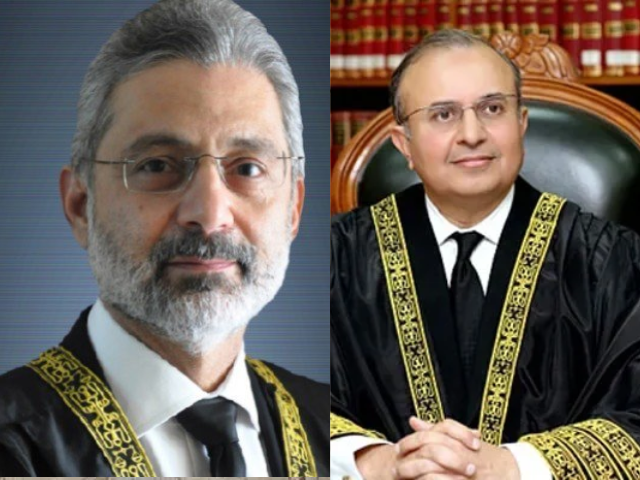For the past 75 years, Pakistan has witnessed an ongoing power struggle between the judiciary and the executive, but this may be the first time that the Supreme Court has visibly split into two distinct factions, openly opposing each other. One group, led by Justice Mansoor Ali Shah, has openly aligned with the Pakistan Tehreek-e-Insaf (PTI), while the other, headed by Chief Justice Qazi Faez Isa, faces allegations of being pro-government.
In recent months, several political events have unfolded in Pakistan, prompting legal and political analysts to express concerns that the country’s major institutions, including the Parliament and the Supreme Court, are not only heading toward instability but are also allegedly suffering from internal divisions. On one hand, parliamentary speeches are filled with criticisms of the judiciary and its recent decisions, while attempts to pass constitutional amendments are underway. On the other, Chief Justice Isa has raised questions within his own institution regarding a press release-like explanatory statement about reserved seats, issued by a majority bench of the Supreme Court, which was unexpectedly published on the court’s official website.
Earlier this month, an eight-member bench of the Supreme Court responded to requests from the Election Commission of Pakistan (ECP) and PTI regarding reserved seats. The court issued a threatening letter to the ECP, stating that, based on the July 12 ruling, candidates who submitted party certificates were not independent but belonged to PTI, and the ECP should immediately allocate the reserved seats to them.
The institutional tug-of-war has intensified following the Supreme Court’s decision on reserved seats. The speakers of the Punjab, Sindh, and National Assemblies have written to the Chief Election Commissioner, urging him not to allocate the reserved seats to PTI, in defiance of the Supreme Court’s ruling. The ruling Pakistan Muslim League (N) has argued that the Supreme Court has entangled itself with its decision on reserved seats. Federal Minister for Law, Azam Nazeer Tarar, reacted to the detailed ruling, stating, “Reserved seats cannot be allocated to PTI. I believe this will lead to another legal battle.”
Commenting on the situation, PML-N Senator Irfan Siddiqui criticised the decision, saying, “Relief has been given to a party that neither approached the Election Commission nor the Supreme Court nor any High Court for these reserved seats.” According to him, the Sunni Ittehad Council was the primary party in the case, and both the Election Commission and the Peshawar High Court had already ruled that the council was not entitled to the reserved seats. Senator Siddiqui added that PML-N and the Pakistan Peoples Party (PPP) have filed appeals for a review of the decision, which are pending before the court. However, certain Supreme Court judges are insisting on immediate compliance with their ruling. PML-N intends to take the matter to Parliament, where, according to Siddiqui, “Parliament will examine this issue to determine whether it violates the Constitution and law before making a final decision.”
Meanwhile, the Election Commission has maintained that since PTI’s internal party elections are still pending, it is inappropriate to allocate the reserved seats to PTI at this time. Legal experts have emphasised the importance of dispelling any impression that the judiciary is leaning toward a particular political party.
Former Supreme Court Judge, Justice (Retired) Faisal Arab, commenting on the Supreme Court’s explanatory statement on reserved seats, said, “In my 15-year career, I have never seen a case where the court issued an explanatory statement before delivering its detailed judgement.” He further stressed that judges must avoid creating the perception of bias and should instead speak through their judgments.
Barrister Salahuddin explained that despite amendments to the Election Act, the Supreme Court’s decision on reserved seats cannot be reversed. He added that while Parliament has the right to amend the law, the Supreme Court has the authority to interpret the Constitution. However, the court must provide strong reasons if it rules that a law passed by Parliament violates the Constitution. Salahuddin criticised the court for issuing an explanatory statement instead of delivering its detailed judgement, which took two and a half months to release.
Ahmed Bilal Mehboob, head of PILDAT, remarked, “A power struggle between institutions is ongoing in Pakistan, and in such conflicts, anything goes.” He noted that every institution is trying to stretch the Constitution’s flexibility in its favour, and if this continues, the country’s Constitution could ultimately collapse. Mehboob warned that as institutions fight for survival at the expense of each other’s rights, democracy becomes a secondary concern. He also pointed out that an “internal battle” is raging within the Supreme Court, with senior judges vying for the position of Chief Justice, while the current Chief Justice seeks an extension. The outcome of this conflict, he said, remains to be seen.
The deepening divisions within the Supreme Court come at a critical juncture for Pakistan, where institutional stability is crucial for maintaining democratic order amidst ongoing political chaos.
